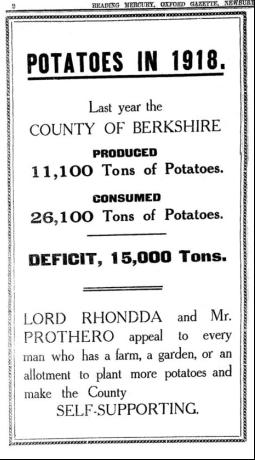
|
Arborfield
|
|
Memories
Related sites:
On 22nd January 1918, an advert for Foster Clark’s Soup was made out to look like a news article. It pointed out that the potato crop was good, making up for
deficiencies in food supply elsewhere. For a nourishing meal, why not
pour their soup over boiled potatoes?
On August 17th 1918, the Household Fuel Rationing Order was announced.
The June 7th 1919 issue carried an article on 'The Shortage of Fuel – Improved Situation' – Brickworks had been short of coal, but the situation was now easing.
On October 4th 1919, the 'Mercury' reported on ‘Reading and the Strike’ – there had been a railway strike for a week or so, which affected the delivery of food and milk, among less perishable goods. There was a brief return to wartime rationing.
|
Food Shortages and Rationing By March 1917, the poor conditions for lifting root crops the previous autumn had caused a potato shortage in the Reading area. Far worse was to come. The September 15th issue reported on the ‘Meat Order’ for the first time; it was predicted that capping the prices of meat would lead to supply problems. On October 27th 1917, an advert from the County Borough of Reading gave a detailed list of maximum prices for different cuts of beef, mutton or lamb, veal, pork, etc., under the Meat Order. Other similar adverts appeared for Wokingham and other town councils. Whether these restrictions affected country areas in quite the same way isn't yet known. The same issue carried an article headed 'THE FOOD PROBLEM IN READING'. It said that sugar, tea, butter, bacon and milk were all in short supply. The problem was exacerbated by the number of soldiers billeted in the area.
THE FOOD PROBLEM IN READING The food problem in Reading is
still very acute. A special enquiry is being made on the Food Controller’s Instructions as to the present needs of the town in regard to butter, sugar, margarine, lard, rice and condensed milk. Vouchers instructing grocers how to obtain their supplies of sugar for the 1st of January have been despatched this week, and returns have been received from all four weeks. Keepers of slaughter-houses have
had to make a return showing the killing capacity of each slaughter-house.
All are to be registered by the local Food Control Committee.
By December 22nd, a local food rationing scheme was announced:
RATIONING SCHEME [A Conference was held on the
previous Tuesday evening on the subject: ] MEETING OF WORKERS A meeting convened by the Trade Unions of the town in regard to the problem was held in the Market Place, Reading, on Sunday afternoon, under the presidency of Mr. A. T. Knight. In spite of the bad weather there was a good attendance. Prior to the meeting there was a procession, which was headed by a band. Miss Blackall moved the following resolution: “That this mass meeting of
the people of Reading is of the opinion The resolution was carried
unanimously. Hundreds of thousands of cattle
are being killed, mainly on account of the high price of feeding stuffs, and
also that the supplies may be kept up, whereas a large number of the beasts
ought to have been kept for beef for the first six months of next year. There is
even a shortage this Christmas, and in several shops there is the possibility of
stocks being exhausted by Monday. Butchers are losing considerably on their sales. They are working under the Meat (Maximum Prices) Order, which allows 1s 2½d per lb for a carcass of meat. That is the most they can make of it. However, best cattle are costing 1s 7½d per lb alive, which shows a loss of about £7 a bullock.
By January 5th 1918, the paper reported: 'Because of the meat shortage, butchers in Reading are to close on Mondays, Tuesdays and Wednesdays until further notice.'
The crisis continued. On 29th January, under the familiar heading 'THE FOOD PROBLEM IN READING', the Mercury recorded that there had been a panic on the previous Friday evening (21st January). 'A near riot ensued when crowds assembled in the neighbourhood of West Street, traffic was held up, and a rush was made on the Maypole establishment at the corner of West Street, the gates were forced open and scales were smashed. 'However, prompt action
was taken by the Mayor and the Chief Constable (Captain J. S. Henderson) and his
officers. Mr. Sarjeant addressed the crowds from a tramcar, and informed them
that the Local Food Control Committee were taking over all the supplies of
margarine, which would be distributed the next morning at a central depôt. […] ' Meat rationing was set at half a pound per head for each adult for a week, and four ounces for every child under five. Workers at the biscuit factory
threatened to strike unless arrangements were made to provide meat for their
children. This was arranged, thus averting the strike. 1,000 children had a
midday meal under these arrangements. On March 23rd:, it was reported that there was an urgent need for more potatoes – on the right is an advertisement from the following week's issue, March 30th. On page 7 from the 30th March, there was another advertisement, this time for something that wasn't in quite such short supply:
FISH for GOOD FRIDAY FINEST QUALITY, LOWEST PRICES. PROMPT DELIVERY TO ALL PARTS JOHN EIGHTEEN RETAIL SHOP 63 OXFORD ROAD, READING.
- The Eighteen family ran a few shops in Reading, and also delivered to the surrounding villages.
|
| |
|
Any Feedback or comments on this website? Please e-mail the webmaster |
